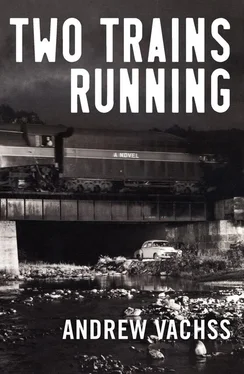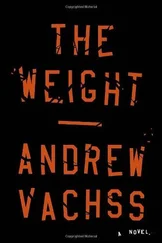“But what about the wild card, Sally? This guy who knocked off Tony and Lorenzo? Don’t you need me around for him?”
“Maybe down the road, but not now. I think this guy, whoever he is, he’s about to make the same mistake about me everybody else does.”
1959 October 04 Sunday 17:38
“You got it?”
“Right here,” Ace said, patting his gang jacket.
“Let’s see it, man,” a sixteen-year-old with an acne-ravaged complexion said, eagerly.
“At the clubhouse,” Ace said. “Tonight. Call everyone in.”
1959 October 04 Sunday 17:41
“Hello…” The woman’s private-line voice was lush with secrets, revealing nothing, promising everything.
“It’s me,” Sherman Layne said.
“Yes. When will you be-?”
“After it gets dark.”
1959 October 04 Sunday 20:46
“We came a long way for these, brother,” the neatly dressed, dark-skinned young man said. “We thought there would be more.”
“Omar says we have to divide up what we have,” Darryl told him.
“Yes, I understand all that,” the young man said. “But we were told to expect five. And we came with the money for five.”
“It’s your decision to make, my brother,” Darryl said.
“What decision is that?”
“You have to decide: Are we calling each other ‘brother’ to mean something? Or do you think we’re just a bunch of gun dealers?”
“I wasn’t saying anything like-”
“This is what happened,” Darryl said, his cadaverous face spectral in the afternoon sunlight. “We made a deal for fifty weapons. We agreed to pay a certain price. When the man-the white man-came here, what he had, instead, was twenty-four. He said they were better than the ones we were supposed to buy. And Kendall, that’s our armorer, he said that was true. The ones we ended up with, they’re not semi-autos like we expected. These ones, you can switch them to full auto, like machine guns.”
“Yes, but-”
“-but that still means less men with a gun in their hand,” Darryl finished the sentence for the other man. “We know this. The man-the white man-he said he took what he could get, and twenty-four was what he could get. What he said was, it’s the same time in prison for twenty-four as it would have been for fifty. And he wanted the same money for the load he did bring.”
“And you paid him?”
“We paid him.”
“So what are we supposed to do now?”
“You were supposed to get ten percent of the shipment,” Darryl said. “You still can, if you want it.”
“Ten percent of twenty-four is-”
“-two point four. Which rounds out to two.”
“Two? Why doesn’t it round out to three?”
“Because the units who took twenty percent, they expected ten. Now they’re going to get five. We take their four point eight up to five, it means your two point four has to drop to two.”
“So they get half of what they expected, but we get less than that,” the young man said, his voice classroom-argumentative, reflecting his other life, a college student.
“These are guns, brother. Not poker chips. There’s no way to divide them more fairly than what I just said.”
“The man talks sense.” The young man’s companion spoke for the first time. “He talks sense about the whole thing.”
“You could of told us about this,” the young man said to Darryl. “Before we made the drive, I mean.”
“You know how it works,” Darryl replied. “We do not talk our business on the telephone, brother. That’s the rules we were given; that’s the rules we live by. Like I said, it’s your decision.”
1959 October 04 Sunday 20:59
“It’s a beauty!”
“Brand-new,” Ace said smugly to the lanky, red-haired youth. “The only way any of those niggers ever saw anything like this before was in a cop’s hand.”
Seven young men, ranging from mid- to late teens, were clustered tightly around a table made from pine planks set across a pair of half-barrels. The pistol lay on the bare wood surface before them: a rare jewel, amateurishly appraised.
The basement was divided into four rooms. Two had long, narrow, street-level windows, another housed an oil-burning furnace. The last, all the way to the back, was furnished with street-salvage: a couch so rotted that its exposed springs had been cut off at their base, with the jagged tips wrapped in black electrical tape; two kitchen chairs with no backs; a once-blue armchair now stained into virtual blackness; a child-sized desk; an army cot; two portable radios; and an assortment of ragged couch pillows strewn randomly on the floor.
No outside light penetrated the room. A single red bulb dangled from exposed overhead wiring, spliced from the adjacent building. Fat hurricane candles burned in several upturned hubcaps. The cement floor was an ashtray.
“This is just the beginning,” Ace told the others. “After Wednesday, when people hear our name, when they see our colors, they’ll pay attention. Because we’re going to be stepping up.”
“Stepping up to what?” a boy named Hog, whose bridgeless nose and wide nostrils had given birth to his name, asked.
“To the rackets,” Ace said: an acolyte, reciting liturgy. “If we just keep on like we’ve been doing, where do you think we end up?”
“We…”
“Got no answer, right, Harold?” Ace said to the red-haired youth. “You think a man like Mr. Dioguardi didn’t get his start the same way we are now?”
“But he’s in the Mafia, right?” the acne-scarred boy said. “They have a whole… organization, and all.”
“He was just an example,” their leader said, smoothly. “You don’t have to be Italian to be in the rackets. Look at Mr. Beaumont. Everybody knows how he got started.”
“He was in a club?” Hog said, incredulously. “In a wheelchair? How was he going to-?”
“He was in something,” Ace said, assuredly. “ ’Cause he had men with him when he made his move. Same as we do.”
“They was older guys,” Hog said.
“How do you know that? I mean, none of us really knows. All we have is… stories. One person tells another person, that’s the only way we ever know anything. But this part isn’t no story: Mr. Dioguardi, he’s got his stuff going, but Locke City, the whole thing, it belongs to Mr. Beaumont. And wherever he started out, it wasn’t on top. It was small.”
“I still don’t see where we could-”
“This is all about rep,” Ace said, confidently. “It’s all about how people see you… us. Mr. Dioguardi even said to me, once, maybe someday he’d have some jobs for us. The Hawks, I mean.”
“He said that to you-to you, personally?”
“That’s right, Hog,” Ace said, choosing to ignore the skeptical tone. He’d speak to Hog later, privately-it didn’t look good for a Warlord to question the President in front of the others. “To me. Face to face. How do you think we got this clubhouse? Mr. Dioguardi owns this building. He owns a whole lot of buildings. On this block, he told me, you men-the Hawks, he was saying-are my eyes and ears.”
“That’s not doing a job,” Harold said.
“Not a big job,” Ace corrected him. “But how is a man like Mr. Dioguardi ever going to know that we can do bigger jobs, unless we grow our rep? After the meet with the Kings, he’s going to know. Everybody’s going to know.”
“Yeah!” Hog said, crossing his arms to show he stood behind their leader.
“We don’t have much of anything now,” Ace told the group. “We’ve got a few blocks, our turf, that’s it. When we bop, it’s not to get new ground, it’s to hold on to what we already got, that’s all. The Gladiators, they’ve got a real clubhouse. A big apartment, over on Harrison. On the second floor, even. They’ve got cars, too. I’ll bet they’ve got fifty members. When they walk down the street, it’s like an army on the march. You don’t see the Kings crossing their line. You don’t see their debs going with outsiders.”
Читать дальше












